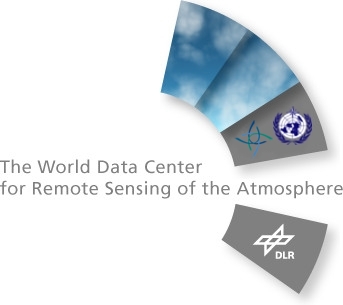
About WDC-RSAT

About WDC-RSAT
The World Data Center for Remote Sensing of the Atmosphere, WDC-RSAT, offers scientists and the general public free access (in the sense of a “one-stop shop”) to a continuously growing collection of atmosphere-related satellite-based data sets (ranging from raw to value added data), information products and services. Focus is on atmospheric trace gases, aerosols, dynamics, radiation, and cloud physical parameters. Complementary information and data on surface parameters (e.g. vegetation index, surface temperatures) is also provided. This is achieved either by giving access to data stored at the data center or by acting as a portal containing links to other providers.
Since 2003 the German Remote Sensing Data Center (DFD) of the German Aerospace Center (DLR) hosts and operates the WDC-RSAT.
WDC-RSAT is the most recent data center in the WMO-WDC family. In the context of IGACO within the WMO program Global Atmosphere Watch (GAW) and in line with the WMO-GAW Strategic Plan 2008-2015, WDC-RSAT especially concerns itself with linking different GAW-relevant data sets both, with each other and with models. In this context WDC-RSAT will also handle non-satellite based data which are relevant within the context of validation. As a contribution to WIGOS and in cooperation with the German Environmental Research Station Schneefernerhaus (UFS), WDC-RSAT is developing techniques providing WMO-GAW global stations with satellite based data and information products and to allow for computing-on-demand applications. Strategies and techniques to properly validate data sets, including for example data assimilation methods, are developed and tested. Aspects of the atmosphere’s variability at different temporal and spatial scales are addressed.
WDC-RSAT cooperates with partners in establishing and making use of modern information technologies (e.g. Grid) in order to promote networking. It is already being implemented as a data publication agent for data related to remote sensing of the atmosphere and is thus authorized to assign so-called ‘Digital Object Identifiers’ (DOI) to data sets. This allows that data sets can be cited similarly such as peer reviewed publications.
WDC-RSAT serves as a communication and data management platform for the recently established international and global Network for the Detection of Mesopause Change (NDMC).
An external advisory committee with representatives from space agencies, weather services and scientific facilities has been established in 2006.